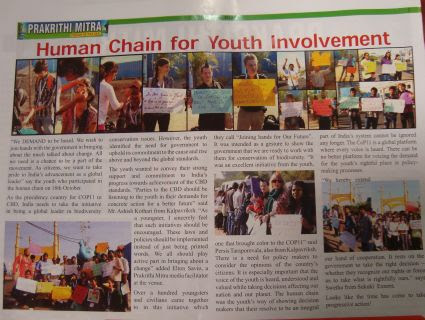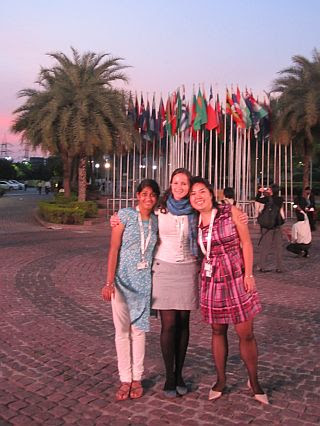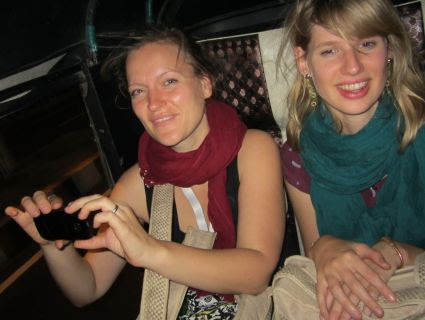19.10.2012
Today is the last day of the CBD COP 11 in Hyderabad, India.
In the morning we discover pictures from our action "Joining hands for Biodiversity" in the Indian press.

Beautiful butterfly girls

Our human chain
At noon time I join the side event from the German Environment Aid (Deutsche Umwelthilfe e.V.) together with C&A and Connon Connect about ecosystem restoration on cotton fields - bringing environmental and economic interests together. This side event presents the successful project “Cotton Connect”, an initiative engaged in ecosystem restoration without GMO and pesticides offering organic cotton and supporting the Better Cotton Initiative, in cooperation with the world´s leading organic cotton clothing retailer C&A and its German NGO-partner DUH. At the same time, this project shows how companies can cooperate with organisations/NGOs jointly aiming to protect biodiversity. The cultivation of cotton is known to have many adverse impacts on biodiversity due to the high usage of pesticides, herbicides and fertilizers. Moreover, recent developments encourage the use of GM seeds and the crop is grown in monocultures; practices that are highly questionable. Many campaigns such as the initiative by Vandana Shiva and others have demonstrated the fatal consequences of the above mentioned practices for biodiversity and small farmers. We offer an alternative and will present Cotton Connect’s role in the global cotton growth and its role in supporting organic cotton cultivation that entails an increase in biodiversity due to the abstention from industrial fertilizers, chemicals and GM seeds as well as the usage of traditional varieties of cotton seeds. Since the establishment of the Cotton Connect initiative, many environmental and biodiversity benefits from organic cotton farming are observed and we are continuously engaged in reducing pesticides and tackle the issue of water use. This work is supported locally, i.e. in India leading producer groups, academics, companies and NGOs are undertaking collaborative work to develop alternatives to GM seeds. C&A is especially interested in the sustainability of the entire supply chain and is therefore highly engaged in the availability of good quality and diverse organic seeds.
At 3 p.m. we gather in hall 1 to be present at the closing ceremony and the last adoptions. Actually we start at 4:30 p.m. but Jayanthi Natarajan, the minister of environment and forests of India, makes the adoptions in good time.

We are waiting.

Alex, Malina, Svana and Meghan

Christoph and I use the time to introduce ourselves
to Thomas Tennhardt and Olaf Tschimpke from NABU.

Then Jayanthi Natarajan comes up and
gets started with the adoptions of negotiation papers.
The final adoptions are postponed to tonight.
We as GYBN are taking the last group pictures in front of the conference hall before we attend the invitation for dinner of Korea, which is the host of the twelfth meeting of the Conference of the Parties to the Convention on Biological Diversity (CBD COP 12).

Swetha, Isabel and Melina


We are GYBN!

Melina, Christoph and Alex are enjoying the Korean music, drinks and food.
Actually the food was Indian and far to little for all delegates. A lot of people were standing in line for two hours and before they could grap something to eat, it was all gone. Also it was dominated by meat and certainly not vegan. But I enjoyed the drinks and the real Indian food on the street later (:

Braulio Dias invites us to the next CBD COP 12 in Korea
and says Goodbye for now.


After the underwhelming party, we check in the plenary hall when the final negotiations start. Till then it is at least three hours to wait. Christoph and Christian decide to stay and participate the final plenary. We others are going to the Tara Hotel where Melina and Meghan stay and spend the night together.

Billy, Swetha, Nymisha and Melina

Nymisha, Juliane, I, Alex and Meghan

Svana, Meghan, Billy, I, Melina and the guy from Peru are dancing.

Later we are driving home in the party riksha.

"That is fun!"
Tomorrow Nymisha and Swetha are taking us for sightseeing in Hyderabad.
Also we hear about the results of the deliberations tonight. The countries finally reached a consensus on resource mobilisation by midnight. The parties have agreed to a "Hyderabad Roadmap" that envisages doubling of the budget that developed countries need to raise for biodiversity conservation by 2015. Sources indicated that this would amount to roughly $12 billion. This target is to be calculated on a baseline of roughly $6 billion which is the average of the budgets earmarked by these parties between 2006 and 2010. This fund will be used to assist developing countries to meet their biodiversity target.
There was also some consensus on 75% of the developing countries integrating biodiversity conservation into their national agenda. An exeption was, however, made for the least developing countries. These agreements will be leagally adopted once passed by the plenary which hab yet to do so at the time of going to press. With the group deciding on the CBD budget in talks till well past midnight, a clear picture as to the budget (financial Resources) is expected on Saturday.
On the NAJU-Blog you find a german version!
____________________

Keine Kommentare:
Kommentar veröffentlichen